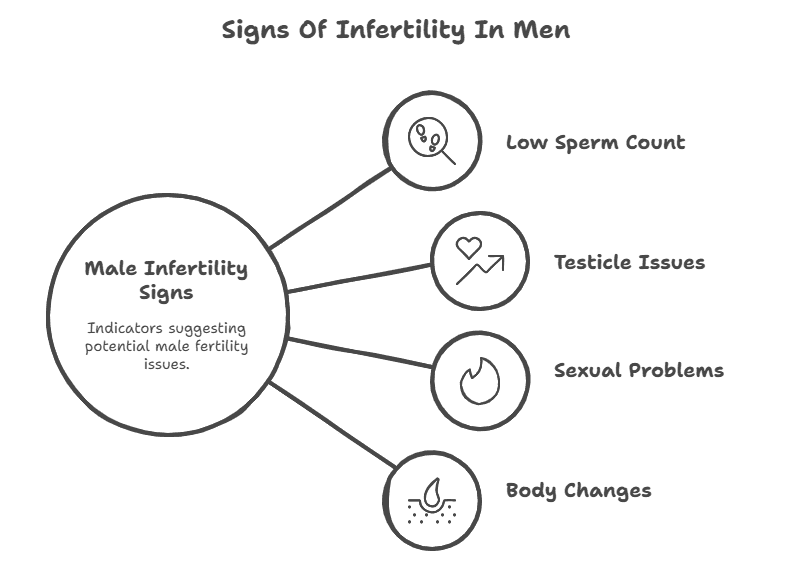Infertility is a sensitive yet increasingly common issue that affects millions of men worldwide. While discussions about fertility often center around women, male infertility contributes to nearly 50% of all infertility cases among couples. Understanding the signs, causes, and when to seek medical help is vital for early diagnosis and treatment. If you’re wondering whether you might be experiencing infertility, this blog will guide you through the most common symptoms, diagnostic steps, and treatment options.
What Is Male Infertility?
Male infertility refers to a man’s inability to cause pregnancy in a fertile female partner after a year or more of regular, unprotected intercourse. This condition can stem from various factors, including problems with sperm production, hormone imbalances, or anatomical issues in the reproductive tract.
Early Signs of Infertility in Men
Infertility often presents with subtle or no noticeable symptoms, which can delay diagnosis. However, several signs may indicate an underlying issue:

1. Problems with Sexual Function
- Difficulty achieving or maintaining an erection (erectile dysfunction)
- Reduced sexual desire (low libido)
- Ejaculation issues (delayed or premature ejaculation, retrograde ejaculation)
- Painful ejaculation or blood in semen
These symptoms can point to hormonal imbalances or blockages affecting fertility.
2. Changes in Testicle Size or Shape
- Swelling, lumps, or discomfort in the testicles
- Smaller-than-normal testicles
- Undescended testicles (a condition from birth that can affect sperm production)
These abnormalities could be signs of varicocele, infection, or other structural issues.
3. Hormonal Imbalances
Hormones like testosterone play a key role in sperm production and libido. Signs of low testosterone include:
- Reduced facial or body hair
- Loss of muscle mass
- Enlarged male breast tissue (gynecomastia)
- Fatigue or mood swings
Hormonal tests can help identify such imbalances and guide treatment options.
4. Pain or Swelling in the Scrotal Area
Pain, discomfort, or swelling in the scrotum may be due to infections (such as epididymitis), testicular torsion, or varicoceles — all of which can affect sperm quality.
5. Recurrent Respiratory Infections
Though less common, frequent respiratory tract infections may indicate a condition called Kartagener syndrome, which involves defective sperm movement (motility).
6. Low Sperm Count or Abnormal Semen
This is often discovered through a semen analysis, where factors such as sperm count, motility, and morphology are assessed. Men with fertility issues may have:
- Low sperm count (oligospermia)
- No sperm in semen (azoospermia)
- Poor sperm movement (asthenozoospermia)
Common Causes of Male Infertility
Several factors can lead to infertility in men, including:
- Varicocele: Enlarged veins in the scrotum that impair sperm production.
- Infections: Sexually transmitted infections (STIs), mumps orchitis, or urinary tract infections can damage reproductive organs.
- Ejaculatory Disorders: Retrograde ejaculation sends semen into the bladder instead of out through the penis.
- Hormonal Disorders: Imbalances in testosterone, LH, FSH, or thyroid hormones can interfere with sperm production.
- Genetic Conditions: Conditions like Klinefelter syndrome or Y-chromosome microdeletions affect fertility.
- Lifestyle Factors: Smoking, excessive alcohol use, drug abuse, obesity, and exposure to environmental toxins can lower fertility.
- Medical Treatments: Radiation, chemotherapy, and certain medications can damage sperm production.
When to See a Doctor
If you’ve been trying to conceive for over a year without success, it’s time to consult a healthcare provider or fertility specialist. Seek help sooner if you experience:
- Erectile dysfunction or ejaculation issues
- Pain or swelling in the testicles
- History of undescended testicles or surgery in the groin
- Past infections or STIs
- Abnormal semen analysis results
- History of chemotherapy or radiation
Diagnosis of Male Infertility
Diagnosing male infertility usually involves:
- Medical History and Physical Exam
Doctors review your medical and sexual history and perform a physical exam to detect any abnormalities in the testes, scrotum, or penis. - Semen Analysis
A key diagnostic tool that evaluates sperm count, motility, morphology, volume, and other characteristics. - Hormonal Testing
Blood tests assess testosterone and other hormone levels to identify endocrine issues. - Scrotal Ultrasound
Helps detect varicocele or structural problems in the reproductive tract. - Genetic Testing
Used if sperm count is extremely low or zero, to detect chromosomal abnormalities. - Post-Ejaculation Urinalysis
To check for retrograde ejaculation by analyzing semen in the urine.
Treatment Options for Male Infertility
The appropriate treatment depends on the underlying cause. Options include:
- Lifestyle Changes: Quitting smoking, reducing alcohol intake, maintaining a healthy weight, and minimizing heat exposure to the testicles.
- Medications: Hormonal therapy, antibiotics for infections, or medications to treat ejaculation issues.
- Surgery: Correction of varicocele or vas deferens obstruction, sperm retrieval procedures for use in assisted reproduction.
- Assisted Reproductive Techniques (ART):
- Intrauterine Insemination (IUI)
- In Vitro Fertilization (IVF)
- Intracytoplasmic Sperm Injection (ICSI)
Emotional Impact and Support
Male infertility can have a profound emotional impact, including feelings of inadequacy, stress, and depression. It’s important to:
- Seek counseling or support groups
- Maintain open communication with your partner
- Focus on overall well-being and mental health
Final Thoughts
Recognizing the early signs of male infertility is the first step toward finding a solution. Though the journey can be challenging, medical advancements offer numerous treatment options and a high success rate. If you’re concerned about your fertility, don’t hesitate to seek professional help. Early intervention can significantly improve your chances of conceiving and starting a family.sper

